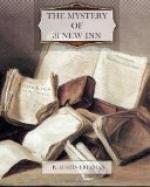The inverted position was not a mere temporary accident, as it might have been if the frame had been stood on a shelf or support. It was hung on the wall, and the plates screwed on the frame showed that its position was permanent and that it had never hung in any other. That it could have been hung up by Jeffrey himself was clearly inconceivable. But allowing that it had been fixed in its present position by some workman when the new tenant moved in, the fact remained that there it had hung, presumably for months, and that Jeffrey Blackmore, with his expert knowledge of the cuneiform character, had never noticed that it was upside down; or, if he had noticed it, that he had never taken the trouble to have it altered.
What could this mean? If he had noticed the error but had not troubled to correct it, that would point to a very singular state of mind, an inertness and indifference remarkable even in an opium-smoker. But assuming such a state of mind, I could not see that it had any bearing on the will, excepting that it was rather inconsistent with the tendency to make fussy and needless alterations which the testator had actually shown. On the other hand, if he had not noticed the inverted position of the photograph he must have been nearly blind or quite idiotic; for the photograph was over two feet long and the characters large enough to be read easily by a person of ordinary eyesight at a distance of forty or fifty feet. Now he obviously was not in a state of dementia, whereas his eyesight was admittedly bad; and it seemed to me that the only conclusion deducible from the photograph was that it furnished a measure of the badness of the deceased man’s vision—that it proved him to have been verging on total blindness.
But there was nothing startling new in this. He had, himself, declared that he was fast losing his sight. And again, what was the bearing of his partial blindness on the will? A totally blind man cannot draw up his will at all. But if he has eyesight sufficient to enable him to write out and sign a will, mere defective vision will not lead him to muddle the provisions. Yet something of this kind seemed to be in Thorndyke’s mind, for now I recalled the question that he had put to the porter: “When you read the will over in Mr. Blackmore’s presence, did you read it aloud?” That question could have but one significance. It implied a doubt as to whether the testator was fully aware of the exact nature of the document that he was signing. Yet, if he was able to write and sign it, surely he was able also to read it through, to say nothing of the fact that, unless he was demented, he must have remembered what he had written.
Thus, once more, my reasoning only led me into a blind alley at the end of which was the will, regular and valid and fulfilling all the requirements that the law imposed. Once again I had to confess myself beaten and in full agreement with Mr. Marchmont that “there was no case”; that “there was nothing in dispute.” Nevertheless, I carefully fixed in the pocket file that Thorndyke had given me the copy that I had made of his notes, together with the notes on our visit to New Inn, and the few and unsatisfactory conclusions at which I had arrived; and this brought me to the end of my first morning in my new capacity.




